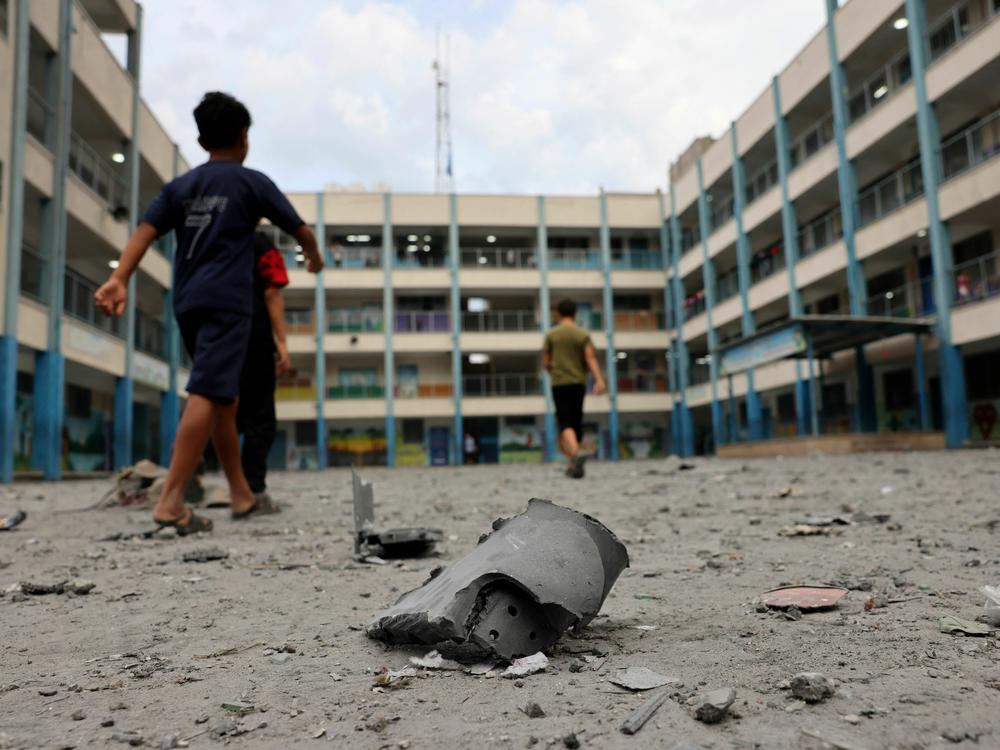Section Branding
Header Content
How to talk to children about the violence in Israel and Gaza
Primary Content
The scale of last weekend's surprise attacks by Hamas militants on Israel has staggered Israel and the world.
Hundreds of Israelis have been killed, thousands injured and dozens still held hostage by Hamas, young children included. Israel's ongoing retaliation has left hundreds of Palestinians dead, at least 90 children among them, according to the Palestinian Ministry of Health. And humanitarian groups are warning of a coming crisis if Israel follows through on its vow to cut off food, water and electricity to Gaza, where nearly half of residents are under 18 years of age.
The news is alarming for anyone — and especially for children, who may be left grappling with questions about why other children are among those affected, and whether they are safe. Here's some advice on how to get started with talking to kids about the conflict.
Be proactive about starting the conversation
Children of all ages deserve a conversation, said experts interviewed by NPR — even those without loved ones who live in Israel or Gaza.
Many children are likely to have heard something already, experts agreed, whether from peers at school, by picking up on news broadcasts or by overhearing adults' conversations.
Often parents choose to sit back, believing that their kids will start a conversation when they feel ready. That can be a mistake, said Waheeda Saif, a program coordinator at Riverside Trauma Center in Massachusetts. "We don't want to wait for our kids to come to us," she said.
Instead, Saif suggests using open-ended questions to start a conversation: "'Have you heard what's been going on in the world?' 'Have you heard anything about what's going on in Israel and Palestine?' And just see what they say, and take it from there," she said.
Older children with access to the internet should be encouraged to be skeptical of videos shared on social media and offered help with evaluating news sources, experts said.
And for younger children, it can be important to assure them of their safety, several said.
"They may actually think it's happening much closer to them than it is. They may not realize quite how far away in the world these events are happening," said Saif. Parents can use a map to show the distance between their home and where the conflict is occurring.
Check in with yourself and brush up on the facts
The best conversations with children about difficult subjects often means talking less and allowing kids to ask questions, said Dimitry Anselme, executive program director at the education group Facing History & Ourselves.
"They need context more than our opinions or political positions. That's not very helpful to them," Anselme said.
For parents to provide that context most effectively, Anselme advised parents to do an internal check-in before opening a conversation with their children. "Start with yourself. Do some personal reflection," he said. "Brush up and make sure you have an understanding of the basic elements of what's happening in the conflict."
(Here are some stories to get you started: What is Hamas? What is the Gaza Strip? And here's the latest update on events.)
Kids can handle tough topics
Children, even those who are quite young, can handle complex topics. Parents need not shy away from explaining historical context to their children, said Maha Bali, a professor of practice at the Center for Learning and Teaching at the American University in Cairo.
During a previous outbreak of violence between Hamas and Israel in 2021, Bali realized that her 9-year-old daughter had already read about Anne Frank and the Holocaust — but she hadn't yet learned about the history of Palestine.
"It was important to know about the Holocaust. It was important to know about Hitler. Therefore, she was also probably ready to learn about Palestine," Bali said.
Together, she and her daughter discussed the region's history, from the formation of Israel out of British-held Palestine in the wake of World War II all the way through the still-running blockade of Gaza, in which Israel controls the flow of people and goods into and out of the territory.
There's no need to oversimplify the conflict. Experts cautioned against equating the actions of individuals or organizations with entire populations.
"We're talking specifically about this individual, this group of individuals. We're not making a general statement about all Jews, all Palestinians," said Anselme of Facing History & Ourselves.
It's OK if you don't have all the answers
It's important for parents and guardians to know that it's OK if they don't have all the answers, said Sivan Zakai, a professor of Jewish education at Hebrew Union College-Jewish Institute of Religion.
"When children are asking parents profound questions about the world — especially about violence in the world — it might initially sound like they're asking their parents to be historians and political scientists all rolled into one," Zakai said. "But ... often their questions are actually asking, 'How can I live in this world even when there are all sorts of terrible things that happen?'"
As pessimistic as you may feel about the state of the world, she added, be sure to allow your child the freedom to imagine (and work toward) a better future.
"Children have a beautiful ability — one that adults sometimes lack — to look head on in the face of violence and still believe in the bottom of their hearts in the future possibility of peace and of coexistence and of resolution to this conflict," she said.
Copyright 2023 NPR. To see more, visit https://www.npr.org.

